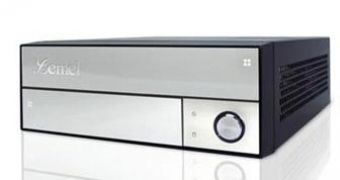With the netbook market continuously increasing, the industry harbors high hopes for the nettop segment as well. As we told you earlier today, ASUS is currently the only manufacturer to have officially launched a desktop version of one of its netbook computers. However, the situation is bound to change in the future, since other two manufacturers are expected to follow suit, by releasing their own nettops.
Micro Star International is one of the two manufacturers in question, and it is already preparing to ship the Wind PC, which was introduced at this year's Computex show in Taipei, Taiwan. The other competitor, Synnex, is a relatively new name in the business but, according to a Digitimes report, it doesn't plan to remain so for long, since it's ready to go neck and neck with ASUS in the emerging nettop market.
All three mentioned manufacturers will put out their own implementation of Intel's small-power 1.6GHz Atom processor. Now, since most of you must already be familiar with the technical specifications of ASUS' Eee Box and MSI's Wind PC, let's have a closer at some of the details of Synnex's Lemel Q PC Smart deluxe nettop.
This nettop will provide its users with a Windows Vista operating system, 2GB of memory, 160GB of storage space, and the graphics power of Intel's 945GC integrated chipset. As you might have noticed, the specs for the Lemel Q PC Smart deluxe nettop are rather impressive - insomuch that they should make it a more attractive solution than ASUS' Eee Box. One of the reasons behind this assertion would, obviously, be the fact that the former provides more storage, more memory and supports Microsoft's Windows Vista.
On the downside, this nettop is slightly bigger than ASUS' product with its 3.1L design and, to cap it all off, it is even priced higher, at US$455.7. Whether the Q PC Smart deluxe will be made available worldwide is yet to be established but, apparently, it is going to drop officially sometime next month.
To sum up, the Lemel is just another example of how Intel's Atom can also power desktop computer systems, and not only those Eee-ish portables.

 14 DAY TRIAL //
14 DAY TRIAL //